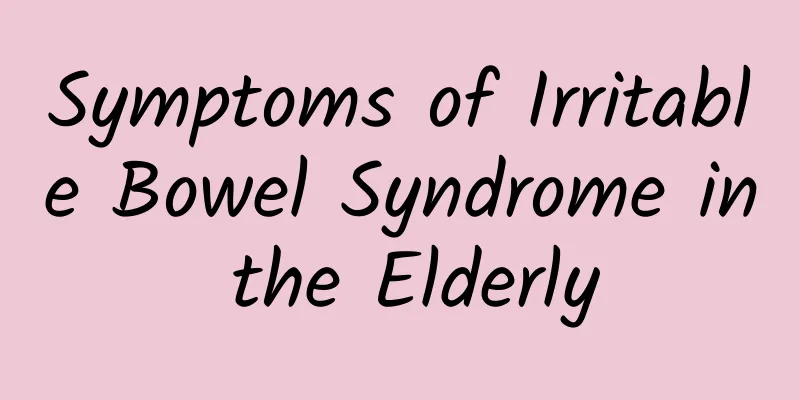Symptoms of Irritable Bowel Syndrome in the Elderly

|
Irritable bowel syndrome in the elderly generally occurs in the elderly because their physical functions are relatively weak and their ability to fight against external pathogens is relatively poor. Irritable bowel syndrome in the elderly is a disease that occurs intermittently. When this disease occurs, there will be symptoms such as abdominal distension and abdominal pain. If you can understand the symptoms of this disease, you can detect the disease in time.
Generally speaking, the symptoms of irritable bowel syndrome in the elderly are more obvious, that is, some discomfort in the body. For example, diarrhea and abdominal distension will be more severe during the day, so everyone should pay attention. (1) Abdominal pain: It is the main symptom of IBS, accompanied by abnormal frequency or shape of bowel movements. The abdominal pain is often relieved after defecation, and some patients tend to experience it after eating. Abdominal pain can occur anywhere in the abdomen and can be localized or diffuse. The pain is of varying nature and intensity but does not progressively increase. Very rarely, it occurs during sleep. (2) Diarrhea: ① Continuous or intermittent diarrhea, with a small amount of stool, which is pasty and contains a large amount of mucus but no blood, and is generally normal under microscopic examination; ② Symptoms disappear after fasting for 72 hours; ③ Symptoms do not occur at night, which is different from organic diseases; ④ About 1/4 of patients can be induced by eating; ⑤ Many patients have alternating diarrhea and constipation. (3) Constipation: Difficulty in defecation, dry and small stools, which may contain a lot of mucus. Constipation may be intermittent or alternate with diarrhea, often accompanied by a feeling of incomplete bowel movement. In the early stage, it is mostly intermittent, but in the later stage, it persists and even leads to long-term dependence on laxatives. (4) Abdominal distension: more severe during the day, especially in the afternoon. Relieved after sleep at night. Abdominal circumference generally does not increase. (5) Non-colonic and extra-intestinal symptoms: Nearly half of the patients had upper gastrointestinal symptoms such as heartburn, early satiety, nausea, and vomiting. Extra-gastrointestinal manifestations such as fatigue, back pain, headache, palpitations, shortness of breath, frequent urination, urgency, and sexual dysfunction are significantly more common than those in organic intestinal diseases. Some patients also have varying degrees of psychological and mental abnormalities, such as anxiety, depression, tension, suspicion, hostility, etc. Through this article, we have introduced knowledge about the symptoms of irritable bowel syndrome in the elderly. We hope that after reading it, you will have a clearer understanding of the symptoms of this disease. If you find it in your life, you should go to a regular hospital for examination and treatment. This is also very helpful for treating the disease. It is better to seek medical treatment from traditional Chinese medicine. |
<<: What to eat for constipation in the elderly
>>: What should elderly people with irritable bowel syndrome not eat?
Recommend
Can chlortetracycline be used to treat body odor?
The cause of body odor is due to large molecular ...
Does Danshen replenish blood?
Danshen is a very nourishing herb. This herb is g...
Sudden echo in the ears
Some people may suddenly feel ear pain and echo i...
What is the reason for the horizontal lines on the waist?
Horizontal lines on the waist are mainly a sign o...
The difference between Huoluo oil and safflower oil
Many people think that Huoluo Oil and Safflower O...
Pictures of herbal medicines
Only when the prescription is combined with good ...
Thyroid ultrasound echo uneven
Each of us should have a thyroid gland, but there...
What to do if you have bloating and constipation
Although constipation is a common and relatively ...
What are the effects, functions and contraindications of processed Polygala
Polygala tenuifolia is a commonly used Chinese me...
What medicine should men take for Yin deficiency and excessive fire?
In men, Yin deficiency and excess fire indicate w...
How long does it take for the enlarged lateral ventricle to be absorbed?
The lateral ventricle is a structure in our human...
Can I eat almonds when I’m pregnant?
Most people know that a woman’s diet during pregn...
What causes stiff hands and feet?
Stiffness in the hands and feet is mostly caused ...
How big is the left adnexal cyst that requires surgery?
In general, the clinical dividing line of adnexal...
The role and benefits of Chengshan
Chengshan point is located in the middle of the b...









